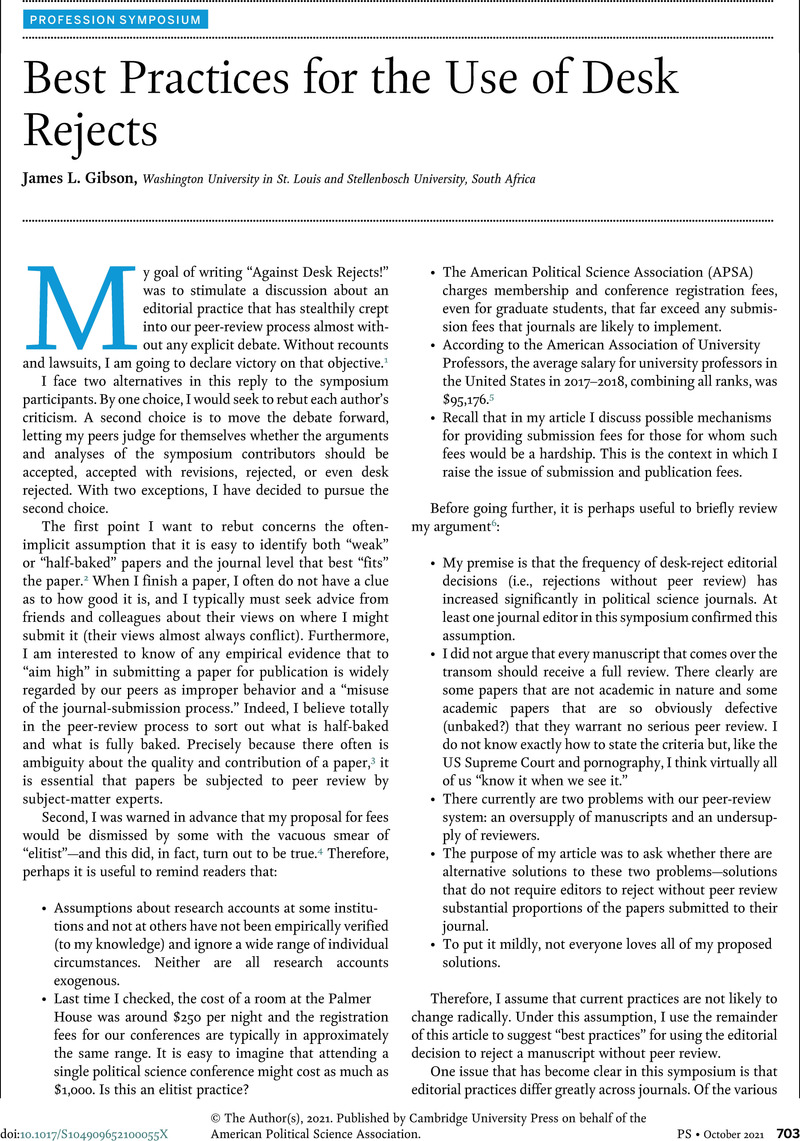No CrossRef data available.
Article contents
Best Practices for the Use of Desk Rejects
Published online by Cambridge University Press: 06 July 2021
Abstract

- Type
- Symposium on Desk Rejections
- Information
- Copyright
- © The Author(s), 2021. Published by Cambridge University Press on behalf of the American Political Science Association
References
NOTES
1. My interest in the issue of desk rejects was initially stimulated during a talk by the social sciences subeditor of Science in which he said that he desk rejects 95% of the submissions he receives.
2. I note also that there seem to be two general criteria for desk rejects: poor quality and lack of fit with the substantive focus of the journal. I published a paper on judicial recusals in one of the top three journals and had a paper on public support for structural changes in the US Supreme Court desk rejected for being too narrow. Go figure! Perhaps “fit” is even more in the “eye of the beholder” than quality.
3. For empirical evidence, I am interested to know for what percentage of published papers in any given journal at least one reviewer recommended that the paper is too weak to publish.
4. It is not clear to me which definition of “elitist” is being proffered and who the “elites” and “masses” are in this matter. For example, the charge includes the claim that it is “elitist” to assert, as I do, that “I certainly do believe that some (perhaps many) graduate students produce publishable work, but most do not…” Comparing this statement with editors’ judgments that “Desk rejecting is also a better use of authors’ time…,” it is not obvious to me which is more “elitist.” Perhaps some will submit that authors, not editors, are the best judge of what constitutes the better use of their time. Moreover, although it may be true that most graduate students at the University of Minnesota and Oxford University produce publishable work at every point in their graduate career, it would be a serious mistake to draw inferences from these two universities to all graduate students in political science. Finally, if the charge of elitism is an ad hominem attack on me because of where I work, the charge is inappropriate, badly mistaken, and far off the mark. In the end, a call for the wider use of peer review cannot be anything but a rejection of elitism.
5. See www.insidehighered.com/news/2018/04/11/aaups-annual-report-faculty-compensation-takes-salary-compression-and-more (accessed November 7, 2020). Survey Report table 1 reports the average salaries in the United States by academic rank.
6. There are many misstatements of my views in the accompanying articles (e.g., I do not assume that a “the majority of desk-rejected submissions are from graduate students”) but correcting them is not the best use of my space in this reply.
7. It might even be useful for journals to specify which subeditor is responsible for reviews of which types of papers, perhaps even using the APSA organized-sections categories.
8. Some editors may want to consider adopting an explicit policy by which those who refuse to review for a journal are not allowed to publish in it.
9. I accept the claim by Bonneau and Kanthak that “it is difficult to attract people to edit journals.”




